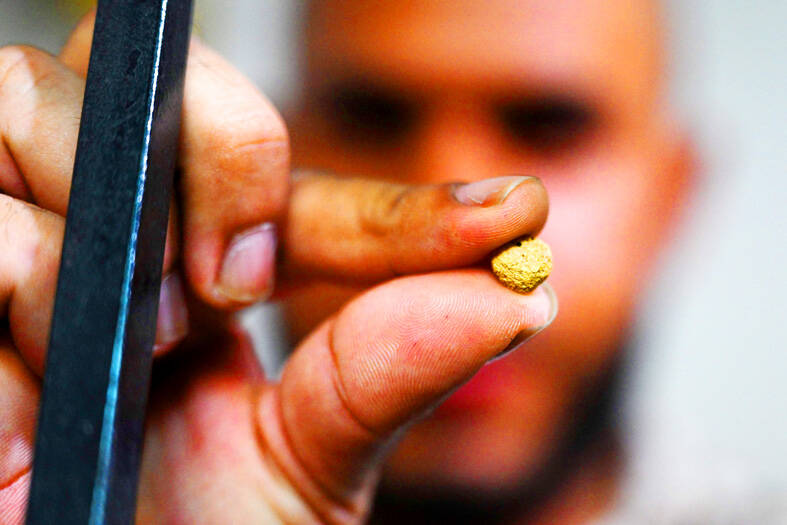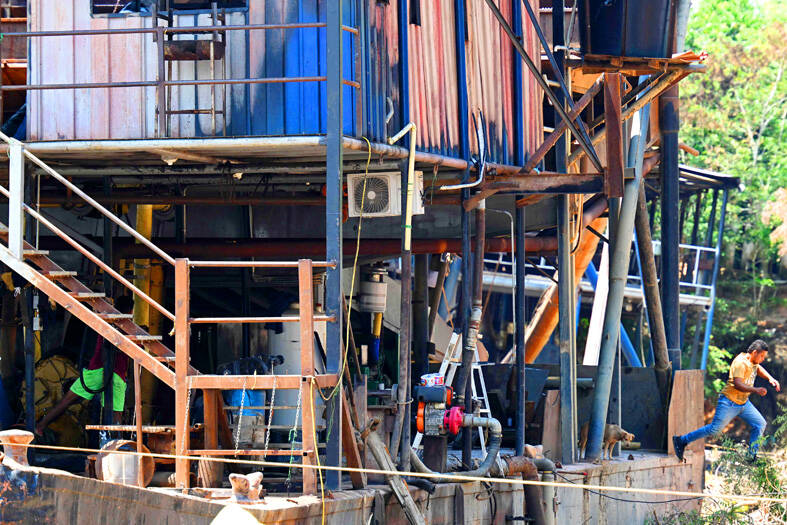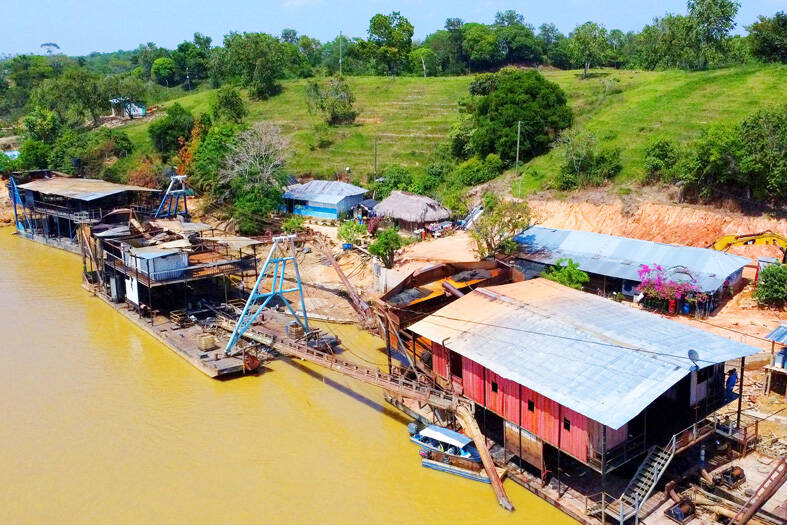The giant skeletons of burnt and dismantled gold dredgers litter the rivers of northwest Colombia, where the government is waging a full-out war on illegal mining.
Nicknamed “dragons” by locals, the massive machines used to suck gold from riverbeds are blamed for destroying the environment and financing organized crime.
Their dismantling in a massive army operation has been met with hostility by communities who depend on mining for their daily survival.

Photo: AFP
Around El Bagre in the gold-rich Bajo Cauca region, a protest by miners that started early last month has been marked by acts of vandalism that the government blamed on the Gulf Clan drug cartel for instigating.
“We have nothing to do with criminal groups,” said Luis Manuel Campo, 32, one of the miners.
Campo co-owns a dredger with three other people.

Photo: AFP
“We are not hiding. We just want the persecution to stop,” he said. “We want to be formally recognized as miners so that we can work in peace, without stigma.”
The names of the villages in this region such as Zaragoza and Caceres serve as a reminder of the Spanish colonizers who were already extracting gold in Bajo Cauca in the 17th century.
It became a bastion of rightwing paramilitary fighters in the 1990s, and is now a stronghold of the Gulf Clan, Colombia’s most powerful cartel.

Photo: AFP
Colombian President Gustavo Petro this month called off a ceasefire with the Clan, accusing it of being behind attacks on civilians committed by protesting miners.
Criminal groups in Colombia make almost as much money from illegal mining as they do from trafficking cocaine, authorities say.
With a recent rise in gold prices, Bajo Cauca has been gripped by a new type of gold rush, with poor communities scouring the gravelly river beds with shovels, bulldozers and dredging machines.

Photo: AFP
“Apart from gold, there is nothing here,” Campo said.
Locals say that about 350 dredging machines are active in the region — big and small — on top of those operated legally by the Mineros Aluvial SAS multinational.
The illegal dredgers range from simple machines with makeshift conveyer belts to larger mechanical contraptions that require several divers to guide a massive vacuum pipe under the dark water.
Then there are the “dragons” — three-story, 20m-long boats with massive engines.
There are about two dozen of these in the Bajo Cauca region.
One “dragon” costs about US$500,000, their owners say.
“At the current [gold] price, it is profitable,” said Alex Cossio, 41, who runs one of these dredgers.
One “dragon” can extract up to 2kg of gold per day — worth more than US$50,000, said a police official, who spoke on the condition of anonymity.
Agence France-Presse (AFP) visited a number of these beasts, including one named “Native” that has been operational for only two months in a branch of the Nechi River.
“The [army] helicopters fly over us every day. We are afraid,” said Cossio, who insisted there was no link to organized crime.
“Diesel, food, logistics... We buy everything in the neighborhood. A large number of families live from our activity,” he added.
AFP observed at least six “dragons” lying mutilated and burnt by the riverside, some already being repaired by their owners.
There is no official data on how many dredgers have been destroyed.
“We tried to stop them, it was terrible,” said Julia Tatis, who owns a small eatery, of a raid this month on three of the machines in Nueva Esperanza, a poor hamlet on the water’s edge.
“The military just arrived saying we are the Gulf Clan, and they burned everything,” dredge owner Juan Manuel Carcamo added.
Campo said that the dredges are working river beds “that were already exploited by Mineros 40 years ago... The damage has already been done.”
Lawyer Francisco Arrieta Franco is an advocate for the miners who he describes as victims.
“It is false to say the dredges belong to the Clan,” he said. “It’s complicated and expensive to operate a dredger. Criminals are more interested in extortion, which is everywhere in this region.”
Locals say the miners are subject to Gulf extortion rather than perpetrators of it.
In a gold shop in El Bagre, an employee warned of trouble if the government continues to “harass” the miners.
“We need these dredgers to work and to eat,” shouted the employee, who did not want to be named. “They serve the whole community.”
Added a miner, also on condition of anonymity: “It is when you have an empty stomach that you are forced to do illegal things.”

To many, Tatu City on the outskirts of Nairobi looks like a success. The first city entirely built by a private company to be operational in east Africa, with about 25,000 people living and working there, it accounts for about two-thirds of all foreign investment in Kenya. Its low-tax status has attracted more than 100 businesses including Heineken, coffee brand Dormans, and the biggest call-center and cold-chain transport firms in the region. However, to some local politicians, Tatu City has looked more like a target for extortion. A parade of governors have demanded land worth millions of dollars in exchange

Hong Kong authorities ramped up sales of the local dollar as the greenback’s slide threatened the foreign-exchange peg. The Hong Kong Monetary Authority (HKMA) sold a record HK$60.5 billion (US$7.8 billion) of the city’s currency, according to an alert sent on its Bloomberg page yesterday in Asia, after it tested the upper end of its trading band. That added to the HK$56.1 billion of sales versus the greenback since Friday. The rapid intervention signals efforts from the city’s authorities to limit the local currency’s moves within its HK$7.75 to HK$7.85 per US dollar trading band. Heavy sales of the local dollar by

Taiwan Semiconductor Manufacturing Co’s (TSMC, 台積電) revenue jumped 48 percent last month, underscoring how electronics firms scrambled to acquire essential components before global tariffs took effect. The main chipmaker for Apple Inc and Nvidia Corp reported monthly sales of NT$349.6 billion (US$11.6 billion). That compares with the average analysts’ estimate for a 38 percent rise in second-quarter revenue. US President Donald Trump’s trade war is prompting economists to retool GDP forecasts worldwide, casting doubt over the outlook for everything from iPhone demand to computing and datacenter construction. However, TSMC — a barometer for global tech spending given its central role in the

The Financial Supervisory Commission (FSC) yesterday met with some of the nation’s largest insurance companies as a skyrocketing New Taiwan dollar piles pressure on their hundreds of billions of dollars in US bond investments. The commission has asked some life insurance firms, among the biggest Asian holders of US debt, to discuss how the rapidly strengthening NT dollar has impacted their operations, people familiar with the matter said. The meeting took place as the NT dollar jumped as much as 5 percent yesterday, its biggest intraday gain in more than three decades. The local currency surged as exporters rushed to